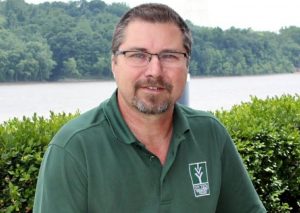
Lawrenceburg, IN — Mark Cauble exemplifies the high-caliber faculty Ivy Tech strives to provide for its students.
A full-time machining technology assistant professor for Ivy Tech Community College working at the Lawrenceburg and Batesville campuses, Cauble is one of the College’s faculty members in the School of Advanced Manufacturing, Engineering, and Applied Science.
Ivy Tech is inviting prospective students and community members to learn more about its School of Advanced Manufacturing, Engineering, and Applied Science at 2 pm on October 25 at the Ivy Tech Lawrenceburg Lakefront Campus. The College will be offering tours of the campus and providing information about academic programs and career opportunities in advanced manufacturing and engineering. Anyone interested in attending the event can RSVP at ivytech.edu/Tuesdays by selecting Lawrenceburg under the location information.
Cauble will be among the faculty present at the October 25 event. His vast experience in machining has equipped him to be an outstanding instructor as he shares this knowledge with his students and prepares them to be superb candidates as they enter the workforce.
Cauble began his career working as a mechanic in Sunman. He achieved his degree in Tool and Die from Vincennes University. Immediately following college, A & G Tool and Die in Miamitown, Ohio, hired him as an apprentice, where he earned a journeyman’s tool and die maker card. This meant he could create metal tools and forge casts from metal, plastic, and other materials. Cauble further developed his career at Osborne Coinage (Cincinnati) as a lead toolmaker and machine builder. In 2008, he established B/C Precision Tool (Greendale), where he is the owner-operator.
During the beginning days of B/C Precision Tool, Cauble met Dr. William Murphy, one of the top audiologists for the U.S. Government. Dr. Murphy was stationed in Cincinnati, working with
the National Institute of Occupational Safety and Health. He introduced Cauble to a project in progress that involved a new testing method for hearing protection. Due to time constraints
and the lack of progress, Dr. Murphy asked if Cauble would consider taking over the research and development of the project and completing it. Cauble agreed and later finished the project,
which changed the method of shock-based hearing testing from previous less accurate methods of the past. The Centers for Disease Control (CDC) released a report documenting the value of
this style of testing and the Environmental Protection Agency approved the method.
The testing unit was incredibly accurate at different levels of sound, as well as repeatable. These specifications are important for data research in improving hearing protection for military personnel and the civilian workforce. After the release of the CDC report, Cauble was contacted by researchers around the country to inquire about this Shocke Tube, which led to his major involvement with laboratories inside the U.S. Navy, U.S. Air Force, 3M, Michaels & Associates, MIT, University of Colorado Medical, University of Buffalo, University of Cincinnati, Triton Systems, Applied Research, Creare Research, and one international sale in France at INRS Research Center.
Currently, this type of testing is accepted as the preferred method of shock wave sound testing for laboratory testing. Additionally, The Shocke Tube is relatively inexpensive considering its
high level of accuracy. Cauble’s accomplishment for this work has also been published by Nature.com, along with researchers from MIT and Harvard. Cauble has also been labeled a team member at The Naval Submarine Medical Research Lab in Groton, Connecticut because the United States Navy is his largest customer.
Since starting this journey, Cauble has developed three different versions of this unit and the fourth is being developed right now. His work is one of the first of its kind performing multiple
shock tube shots are repeatable at one millisecond consistently.
(Ivy Tech Community College press release)



